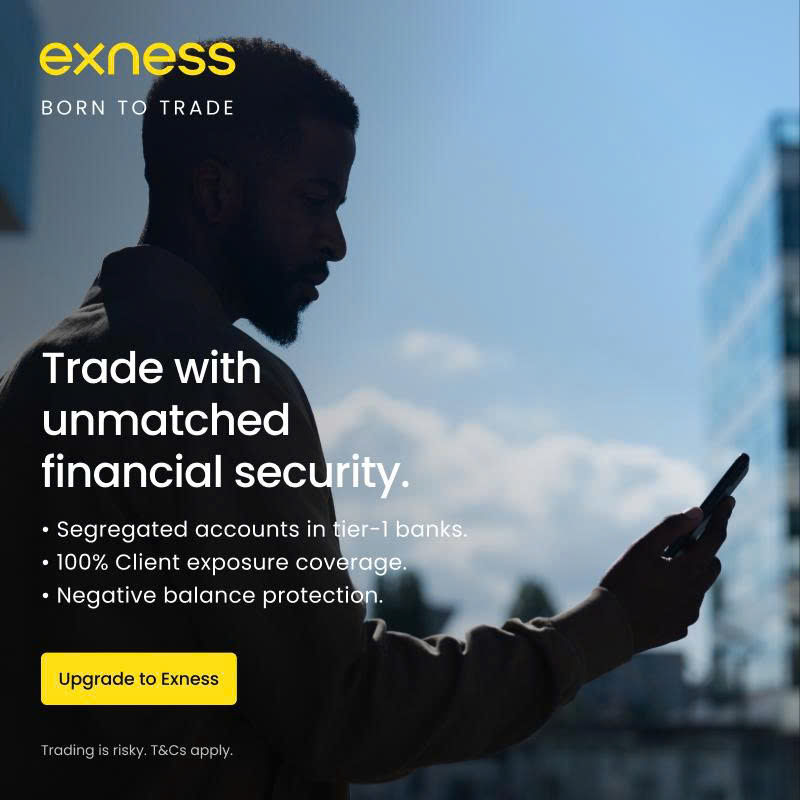
7 minute read
Is Forex Trading Legal in Trinidad and Tobago? A Clear Guide for Beginners
If you’re in Trinidad and Tobago and wondering, “Is forex trading legal?”—the answer is yes, forex trading is legal in Trinidad and Tobago. However, there’s a catch: it’s not locally regulated, meaning you’ll likely trade through international brokers. This can raise questions about safety, compliance, and how to get started. Don’t worry—I’ve got you covered. In this guide, I’ll break down the legality of forex trading in Trinidad and Tobago, the regulatory landscape, how to trade safely, and key tips for beginners. Let’s dive in!
Top 4 Best Forex Brokers in Trinidad and Tobago
1️⃣ Exness: Open An Account or Visit Brokers 🏆
2️⃣ XM: Open An Account or Visit Brokers 💥
3️⃣ JustMarkets: Open An Account or Visit Brokers ✅
4️⃣ Quotex: Open An Account or Visit Brokers 🌐
Understanding Forex Trading in Trinidad and Tobago
Forex trading, or foreign exchange trading, involves buying and selling currency pairs to profit from fluctuations in exchange rates. It’s the largest financial market globally, with a daily trading volume exceeding $6 trillion. In Trinidad and Tobago, forex trading has gained traction as people look for ways to diversify their income, especially amid economic challenges like foreign exchange shortages and a reliance on the energy sector.
But here’s the deal: while forex trading is legal, the Central Bank of Trinidad and Tobago (CBTT) and the Trinidad and Tobago Securities and Exchange Commission (TTSEC) don’t directly regulate retail forex brokers. This means there are no locally licensed forex brokers in Trinidad and Tobago. Instead, traders typically use international brokers regulated by reputable authorities like the UK’s Financial Conduct Authority (FCA), Australia’s ASIC, or Cyprus’s CySEC.
Why Is There No Local Regulation?
You might be wondering why Trinidad and Tobago doesn’t have a robust regulatory framework for forex trading. The answer lies in the country’s financial landscape. The CBTT focuses on managing monetary policy and foreign exchange controls, particularly due to periodic shortages of U.S. dollars. The TTSEC oversees securities and investment firms but doesn’t issue licenses specifically for forex brokers. This lack of local regulation doesn’t make forex trading illegal—it just means you need to be extra cautious when choosing a broker.
The absence of local oversight can feel like navigating a jungle without a map. But don’t let that scare you off. By choosing a reputable international broker, you can trade forex safely and legally. The key is knowing what to look for, which we’ll get to in a bit.
The Economic Context: Why Forex Trading Matters in Trinidad and Tobago
Trinidad and Tobago’s economy is heavily tied to oil and gas, which makes it vulnerable to global energy market shifts. Add to that a managed float exchange rate for the Trinidad and Tobago Dollar (TTD) and periodic foreign exchange shortages, and you’ve got a recipe for financial uncertainty. For many locals, forex trading offers a way to hedge against these challenges and potentially stabilize their personal finances.
For example, trading major currency pairs like EUR/USD or USD/JPY can give you access to global markets without relying on the TTD, which isn’t widely supported on most forex platforms due to low trading volumes. This makes forex trading an attractive option for those looking to diversify their income streams.
How to Trade Forex Legally and Safely in Trinidad and Tobago
Since forex trading is legal but unregulated locally, here’s a step-by-step guide to ensure you’re trading safely:
1. Choose a Regulated BrokerAlways pick a broker regulated by a reputable authority like the FCA, ASIC, or CySEC. These regulators enforce strict standards, such as segregated client accounts and regular audits, to protect your funds. Some trusted brokers that accept traders from Trinidad and Tobago include:
XM: Offers low spreads starting at 0.8 pips and a $5 minimum deposit.
Pepperstone: Regulated by multiple authorities, including FCA and ASIC, with spreads from 0.0 pips.
IG: Known for its strong regulatory framework and extensive educational resources.Check the broker’s license on the regulator’s website and read reviews from other traders to ensure they’re trustworthy.
2. Verify Payment OptionsFunding your trading account can be tricky due to foreign exchange controls in Trinidad and Tobago. Look for brokers that support local payment methods like credit/debit cards, bank wire transfers, or e-wallets like Skrill or Neteller. Some brokers even accept crypto payments, which are legal in Trinidad and Tobago.

✅ Trade with Exness now: Open An Account or Visit Brokers 👈
3. Understand Tax ImplicationsForex profits in Trinidad and Tobago may be subject to income tax if trading is your primary income source. Tax rates range from 25% to 30%, depending on your income bracket. Since there’s no capital gains tax on investments held longer than 12 months, day trading profits are more likely to be taxed as business income. Consult a tax professional to stay compliant with the Board of Inland Revenue (BIR).
4. Use a Reliable Trading PlatformMost brokers offer platforms like MetaTrader 4 (MT4) or MetaTrader 5 (MT5), which are user-friendly and packed with tools like charting, technical indicators, and automated trading options. Ensure the platform is stable and suits your trading style.
5. Practice Risk ManagementForex trading is high-risk, especially with leverage. Set stop-loss and take-profit levels to limit losses and lock in gains. Avoid brokers promising “guaranteed profits”—they’re often scams. Start with a demo account to practice without risking real money.
6. Stay InformedKeep up with global economic trends and local regulations. The CBTT’s foreign exchange policies can impact your ability to fund accounts or withdraw profits, so stay updated through reliable sources like the CBTT website or financial news outlets.
Challenges and Risks of Forex Trading in Trinidad and Tobago
Forex trading isn’t all sunshine and profits. Here are some challenges to watch out for:
Foreign Exchange Shortages: Trinidad and Tobago has faced U.S. dollar shortages since 2015, which can delay funding your trading account or repatriating profits. Wait times for USD conversions can range from three to nine months.
Unregulated Brokers: Trading with unlicensed brokers can lead to financial loss or scams. Always verify a broker’s regulation status.
High Volatility: Forex markets are volatile, and leverage can amplify both gains and losses. Without proper risk management, you could lose more than your initial investment.
Lack of Local Support: Since there are no locally regulated brokers, you may face challenges with customer support or dispute resolution when using international platforms.
Tips for Beginners in Trinidad and Tobago
If you’re new to forex trading, here’s how to get started on the right foot:
Start Small: Open an account with a low minimum deposit (e.g., XM’s $5 minimum) and trade small lot sizes to minimize risk.
Educate Yourself: Use free resources from brokers like IG’s educational guides or XM’s webinars to learn the basics of technical analysis, risk management, and trading strategies.
Focus on Major Pairs: Since the TTD isn’t widely traded, stick to liquid pairs like EUR/USD or USD/JPY for better spreads and volatility.
Test with a Demo Account: Practice on a demo account to get comfortable with the platform and develop your strategy before risking real money.
Stay Disciplined: Avoid emotional trading. Set a trading plan with clear entry and exit points and stick to it.
The Future of Forex Trading in Trinidad and Tobago
Forex trading is growing in popularity in Trinidad and Tobago, driven by increasing internet access, mobile technology, and financial literacy. However, the lack of local regulation and foreign exchange challenges could slow its growth. The TTSEC and CBTT may introduce stricter guidelines in the future, but for now, traders must rely on international brokers and stay vigilant about scams.
There’s also potential for growth in related areas, like crypto trading, which is legal and supported by some forex brokers via e-wal Growns. This could provide an alternative way to fund trading accounts if USD shortages persist.
Conclusion: Is Forex Trading Worth It in Trinidad and Tobago?
Forex trading in Trinidad and Tobago is legal, accessible, and full of potential—but it comes with risks and challenges. By choosing a regulated international broker, staying informed about local foreign exchange policies, and practicing solid risk management, you can trade safely and potentially profit in this dynamic market. It’s not a get-rich-quick scheme, but with education and discipline, forex trading can be a rewarding way to diversify your income.
✅ Trade with Exness now: Open An Account or Visit Brokers 👈
Read more:

